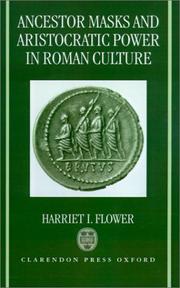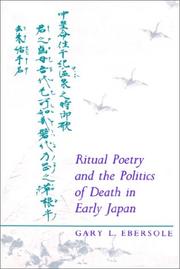| Listing 1 - 9 of 9 |
Sort by
|
Book
ISBN: 9789589825259 9589825257 Year: 2011 Publisher: Bogotá D.C. : Fundación de Investigaciones Arqueológicas Nacionales,
Abstract | Keywords | Export | Availability | Bookmark
 Loading...
Loading...Choose an application
- Reference Manager
- EndNote
- RefWorks (Direct export to RefWorks)
Funerales --- Tumbas --- Ritos y ceremonias
Book
Year: 1984 Publisher: Suita, Osaka, Japan : National Museum of Ethnology,
Abstract | Keywords | Export | Availability | Bookmark
 Loading...
Loading...Choose an application
- Reference Manager
- EndNote
- RefWorks (Direct export to RefWorks)
Ethnologie --- Mixe (Indiens) --- Mixe Indians --- Mixes (Indios) --- Mixteken. --- Riten. --- Moeurs et coutumes. --- Rites et cérémonies. --- Rites and ceremonies. --- Social life and customs. --- Ritos y ceremonias.
Book
ISBN: 6075640568 9786075640563 Year: 2020 Publisher: [S.l.] El colegio de mexico
Abstract | Keywords | Export | Availability | Bookmark
 Loading...
Loading...Choose an application
- Reference Manager
- EndNote
- RefWorks (Direct export to RefWorks)
Festivals --- Folklore --- Ritos y ceremonias --- Festivales --- Rites and ceremonies --- Latin America --- América Latina --- Social life and customs --- Vida social y costumbres
Book
ISBN: 607539298X 9786075392981 Year: 2019 Publisher: Ciudad de México Instituto Nacional de Antropología e Historia - INAH
Abstract | Keywords | Export | Availability | Bookmark
 Loading...
Loading...Choose an application
- Reference Manager
- EndNote
- RefWorks (Direct export to RefWorks)
Death. --- Funeral rites and ceremonies. --- Philosophy and religion. --- Muerte --- Religión y filosofía. --- Ritos y ceremonias fúnebres. --- Aspectos religiosos.
Book
ISBN: 6075392467 Year: 2018 Publisher: México, D.F. : Instituto Nacional de Antropología e Historia,
Abstract | Keywords | Export | Availability | Bookmark
 Loading...
Loading...Choose an application
- Reference Manager
- EndNote
- RefWorks (Direct export to RefWorks)
Yólotl González Torres es maestra emérita del Instituto Nacional de antropología e Historia. Su obra es referente obligado de lectura. En este volumen que le rinde homenaje, los académicos que participan presentan sus propios estudios sobre temas que abordan formas del pensamiento, tanto en el México prehispánico como en el actual, en áreas que Yólotl González ha estudiado como especialista en el campo de las religiones comparadas. Un capítulo está dedicado a la india, país en donde también ella ha realizado investigaciones. De esta manera, historiadores, antropólogos, arqueólogos y filósofos de diversas instituciones mexicanas como el INAH, la UNAM, el Colegio de México, la Universidad Veracruzana y la UAM, dedicados al estudio de las cosmovisiones, analizan los sacrificios humanos, el uso de los alucinógenos, el neochamanismo asociado al New Age, que aparece en los medios urbanos, las danzas y el culto a la Santa Muerte surgido en fechas relativamente recientes; así como otros aspectos del pensamiento de ayer y de hoy, brindando así un extenso panorama que será de interés tanto para los especialistas como para el público en general, preocupado por conocer cómo se ha intentado interpretar los fenómenos que ocurren en el mundo en el que vivimos -- De la cubierta posterior.
Excavaciones arqueológicas --- Indians of Mexico --- Religiones. --- Ritos y ceremonias --- Antropología de la religión --- Rites and ceremonies. --- Religion. --- González Torres, Yólotl.
Book
ISBN: 9788484832263 8484832260 Year: 2004 Publisher: Alcañiz Instituto de Estudios Humanisticos
Abstract | Keywords | Export | Availability | Bookmark
 Loading...
Loading...Choose an application
- Reference Manager
- EndNote
- RefWorks (Direct export to RefWorks)
Funeral rites and ceremonies --- Pacheco, Francisco --- Ritos y ceremonias fúnebres --- History --- Crítica e interpretación. --- España --- Siglo XVI-XVII. --- Ana, --- Pacheco, Francisco, --- Death and burial --- Exequias. --- Spain --- Kings and rulers --- Death and burial.

ISBN: 0198150180 9780198150183 Year: 1996 Publisher: Oxford : Clarendon Press,
Abstract | Keywords | Export | Availability | Bookmark
 Loading...
Loading...Choose an application
- Reference Manager
- EndNote
- RefWorks (Direct export to RefWorks)
Funerales --- Máscaras --- Poder (Ciencias sociales) --- Élite (Ciencias sociales) --- Ritos y ceremonias --- Roma --- Nobleza. --- --Rite funéraire --- --Religions antiques --- --Culte --- -Masks --- Elite (Social sciences) --- Funeral rites and ceremonies --- Masks --- Nobility --- Power (Social sciences) --- Empowerment (Social sciences) --- Political power --- Exchange theory (Sociology) --- Political science --- Social sciences --- Sociology --- Consensus (Social sciences) --- Costume --- Carnival --- Funeral rites and ceremonies, Roman --- Elites (Social sciences) --- Leadership --- Social classes --- Social groups --- Classes sociales --- --Élites --- --Rome ancienne --- --Rome --- --Funerales --- --Elite (Social sciences) --- Funeral rites and ceremonies - Rome --- Power (Social sciences) - Rome --- Masks - Rome --- Nobility - Rome --- Elite (Social sciences) - Rome --- Élites --- Rite funéraire --- Rome ancienne --- Religions antiques --- Culte --- Rome
Book
ISBN: 1789695961 1789695953 9781789695953 9781789695960 Year: 2019 Publisher: Oxford : Archaeopress Publishing Ltd,
Abstract | Keywords | Export | Availability | Bookmark
 Loading...
Loading...Choose an application
- Reference Manager
- EndNote
- RefWorks (Direct export to RefWorks)
The Festivals of Opet, the Valley, and the New Year: Their socio-religious functions compares the religious and social functions of these three Festivals, the first two of which were often regarded by the Egyptians as a pair; the New Year Festival stands out on account of its corpus of surviving material and importance. Until now, detailed study of the New Year Festival has only been carried out with reference to the Greco-Roman period; this study turns its attention to the New Kingdom. The book analyses the broad perspectives that encompass Egyptian religion and cult practices which provided the context not only for worship and prayer, but also for the formation of social identity and responsibility. The festivals are examined in the whole together with their settings in the religious and urban landscapes. The best example is New Kingdom Thebes where large temples and burial sites survive intact today with processional routes connecting some of them. Also presented are the abundant written sources providing deep insight into those feasts celebrated for Amun-Re, the king of the gods. The volume also includes a list of dated records which provides a concordance for the Egyptian calendars.
Rites and ceremonies --- Egypt --- Religious life and customs. --- Religion. --- Ceremonies --- Cult --- Cultus --- Ecclesiastical rites and ceremonies --- Religious ceremonies --- Religious rites --- Rites of passage --- Traditions --- Ritualism --- Manners and customs --- Mysteries, Religious --- Ritual --- Égypte --- Ägypten --- Egitto --- Egipet --- Egiptos --- Miṣr --- Southern Region (United Arab Republic) --- Egyptian Region (United Arab Republic) --- Iqlīm al-Janūbī (United Arab Republic) --- Egyptian Territory (United Arab Republic) --- Egipat --- Arab Republic of Egypt --- A.R.E. --- ARE (Arab Republic of Egypt) --- Jumhūrīyat Miṣr al-ʻArabīyah --- Mitsrayim --- Egipt --- Ijiptʻŭ --- Misri --- Ancient Egypt --- Gouvernement royal égyptien --- جمهورية مصر العربية --- مِصر --- مَصر --- Maṣr --- Khēmi --- エジプト --- Ejiputo --- Egypti --- Egypten --- מצרים --- United Arab Republic --- Ritos y ceremonias --- Fiestas religiosas --- Egipto --- Egito --- Usos y costumbres --- Vida religiosa --- Religión --- Religion --- Sacred space

ISBN: 0691019290 9780691019291 0691073384 0691218293 Year: 1992 Publisher: Princeton Princeton University Press
Abstract | Keywords | Export | Availability | Bookmark
 Loading...
Loading...Choose an application
- Reference Manager
- EndNote
- RefWorks (Direct export to RefWorks)
This examination of death rituals in early Japan finds in the practice of double burial a key to understanding the Taika Era (645-710 A.D.). Drawing on narratives and poems from the earliest Japanese texts--the Kojiki, the Nihonshoki, and the Man'yoshu, an anthology of poetry--it argues that double burial was the center of a manipulation of myth and ritual for specific ideological and factional purposes. "This volume has significantly raised the standard of scholarship on early Japanese and Man'yoshu studies."--Joseph Kitagawa "So convincing is the historical and religious thought displayed here, it is impossible to imagine how anyone can ever again read these documents in the old way."--Alan L. Miller, The Journal of Religion "A central resource for historians of early Japan."--David L. Barnhill, History of Religions
Death --- Funeral rites and ceremonies --- Japanese poetry --- Mythology, Japanese. --- J4157 --- J4600.10 --- J4626 --- Japanese mythology --- Dying --- End of life --- Life --- Terminal care --- Terminally ill --- Thanatology --- Political aspects --- History and criticism. --- Japan: Sociology and anthropology -- customs, folklore and culture -- treatment of the dead and funerals --- Japan: Politics and law -- history -- earliest and premodern --- Japan: Politics and law -- state -- ceremonies and rites --- Philosophy --- Japan --- Court and courtiers. --- Politics and government --- Death customs, history --- Mythologie [Japanse ] --- Mythologie japonaise --- Mythology [Japanese ] --- Mythology, Japanese --- History and criticism --- Court and courtiers --- To 794 --- Akima Toshio. --- Alexiou, Margaret. --- Ame-no-waka-hiko. --- Bidatsu, Emperor. --- Buddhism in court. --- Ellwood, Robert. --- Geertz, Clifford. --- Hikohito, Prince. --- Ise Priestess. --- Ise Shrine. --- Izanagi-Izanami myth. --- Jinshin War. --- Jitō, Empress. --- Kawashima, Prince. --- Ninigi no mikoto. --- Okuninushi. --- Saimei, Empress. --- Soga no Emishi. --- Susano-o. --- agricultural rites and symbolism. --- authorship. --- banka. --- court rationality. --- cremation. --- divination. --- dreams. --- eulogies. --- female power. --- fire. --- historiographic project. --- katami. --- kunimi. --- liminality. --- literacy. --- miru. --- mogari no miya. --- mountains. --- niiname-sai. --- politics of death. --- praise poems. --- repression, textual. --- Ōtsu, Prince. --- Poesía japonesa --- Funerales --- Muerte --- Historia y crítica. --- Ritos y ceremonias --- Aspecto político --- Japón --- al-Yābān --- Giappone --- Government of Japan --- Iapōnia --- I︠A︡ponii︠a︡ --- Japam --- Japani --- Japão --- Japon --- Japonia --- Japonsko --- Japonya --- Jih-pen --- Mư̄ang Yīpun --- Nihon --- Nihon-koku --- Nihonkoku --- Nippon --- Nippon-koku --- Nipponkoku --- Prathēt Yīpun --- Riben --- State of Japan --- Yābān --- Yapan --- Yīpun --- Zhāpān --- Япония --- اليابان --- يابان --- 日本 --- 日本国 --- Política y gobierno --- Corte y cortesanos. --- Death - Political aspects - Japan. --- Funeral rites and ceremonies - Japan. --- Japanese poetry - To 794 - History and criticism. --- Jepun --- Yapon --- Yapon Ulus --- I︠A︡pon --- Япон --- I︠A︡pon Uls --- Япон Улс
| Listing 1 - 9 of 9 |
Sort by
|

 Search
Search Feedback
Feedback About UniCat
About UniCat  Help
Help News
News